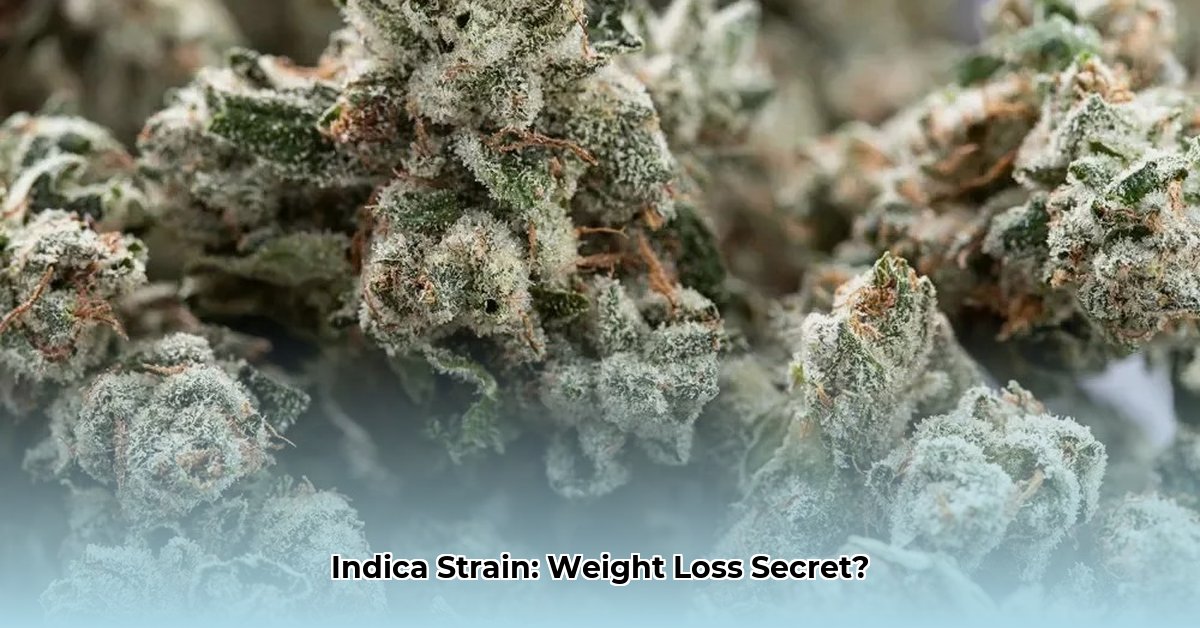
Indica Strain for Weight Loss: Separating Fact from Fiction
The notion that certain indica strains promote weight loss is widespread, yet scientific evidence remains inconclusive. While anecdotal reports abound, a cautious approach is crucial. This article explores the existing research on cannabis and weight management, focusing on the potential role of indica strains, while emphasizing the need for professional guidance. Remember, using cannabis for weight loss should only be considered after consulting your doctor.
Decoding the Cannabis Cocktail: More Than Just Indica
Cannabis comprises various compounds, each potentially influencing the body differently. Understanding their interplay is key to understanding the complexities of its impact on weight.
- THC (Tetrahydrocannabinol): Known for its psychoactive effects, THC often increases appetite (the "munchies").
- CBD (Cannabidiol): Generally non-psychoactive, CBD may reduce appetite in some, although further research is needed.
- THCV (Tetrahydrocannabivarin): Showing potential for appetite suppression, THCV is a subject of ongoing research regarding its efficacy in weight loss.
The ratios of these cannabinoids, and their interaction with other compounds like terpenes, determine the overall effect. Simply labeling a strain as "indica" isn't sufficient to predict its impact on weight.
The Unsung Heroes (and sometimes villains): Terpenes
Terpenes, aromatic oils in cannabis, influence aroma, flavor, and potential effects. Humulene, for example, is being studied for its potential appetite-regulating properties, but research is still in its early stages. The complex interplay of cannabinoids and terpenes significantly impacts the overall effect of a cannabis strain.
Indica Strains and Weight Loss: A Realistic Perspective
The belief that all indica strains cause weight loss is a simplification. The precise cannabinoid and terpene profiles, and their ratios, are far more critical than the broad "indica" classification. Therefore, relying solely on the indica label for weight loss is misleading. A careful examination of the strain's specific chemical composition is essential.
The Weighing Scale of Pros and Cons
Before considering cannabis for weight loss, carefully consider both potential benefits and risks.
| Potential Benefits | Potential Drawbacks |
|---|---|
| Appetite suppression (especially with high THCV/CBD) | Increased appetite ("the munchies") – particularly with high THC |
| Potential metabolic effects (research is ongoing) | Digestive issues (nausea, constipation) |
| May help manage stress-related eating (indirectly) | Risk of dependence and withdrawal symptoms |
| Potential for liver problems with long-term, heavy use |
Isn't it crucial to weigh these factors before making a decision?
A Measured Approach: Steps for Responsible Use
Considering cannabis for weight loss requires a measured and responsible approach:
- Consult Your Doctor: Discuss your plan with a healthcare professional to understand potential risks and benefits.
- Lifestyle Changes First: A balanced diet and exercise remain critical for sustainable weight loss; cannabis is a supplement, not a replacement.
- Start Low and Steady: Begin with a low dose and carefully monitor your body's response before increasing.
- Choose Reliable Sources: Obtain cannabis from reputable sources providing detailed lab testing.
- Patience and Monitoring: Weight loss takes time and consistent effort. Track your progress and adjust as needed.
Isn't it surprising how many fail to consider these straightforward steps?
How to Safely Use High-THCV Cannabis Strains for Weight Loss
Key Takeaways:
- High-THCV cannabis strains may aid weight loss, but research is ongoing.
- Individual responses to THCV vary significantly.
- Combining cannabis with a healthy lifestyle is crucial.
- Always consult a healthcare professional before using cannabis for weight loss.
- Choose reputable sources to ensure product quality and safety.
- Start with low doses and gradually increase, carefully monitoring your response.
- Be aware of potential side effects like anxiety or digestive issues.
- "Indica" alone doesn't guarantee weight loss; THCV content is key.
Understanding the Science
THC's appetite-stimulating effects are well-known, contrasting with CBD's potential appetite-reducing effects (though research is ongoing). THCV, however, shows promise in appetite suppression, but more research is needed to fully understand its mechanisms. The interaction of cannabinoids and terpenes further complicates this picture.
Indica Strains and THCV: A Closer Look
While "indica" is often associated with relaxation, this doesn't automatically translate to weight loss or gain. The specific cannabinoid and terpene profiles dictate the effects, with high-THCV strains potentially leading to appetite suppression. Always check the lab-tested cannabinoid profile for accurate information.
Potential Risks and Side Effects
Potential side effects of high-THCV strains can include anxiety, paranoia, dizziness, nausea, and digestive problems. Long-term effects are still being researched. Cannabis can also interact negatively with other medications. Consulting a doctor is extremely important.
Practical Steps for Safe Use
- Consult your doctor: Discuss your weight loss plan and potential risks.
- Choose reputable sources: Ensure accurate THCV content through lab-tested products.
- Start low and go slow: Gradually increase dosage only if tolerated.
- Integrate lifestyle changes: Cannabis is a supplement, not a replacement for healthy habits.
- Monitor your progress: Track weight, appetite, and side effects; adjust accordingly.
- Be mindful of "the munchies": Even with high-THCV strains, THC can stimulate appetite.
Additional Considerations
Legal status varies greatly, affecting accessibility and regulation. Being aware of local laws is crucial. Individual responses differ; success depends on a holistic approach combining informed cannabis use with a healthy lifestyle. Remember, more research is needed before drawing definitive conclusions.